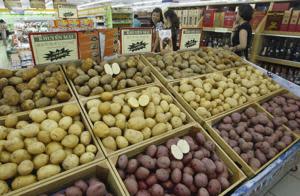 Science and Weather
Science and WeatherWheat, soybeans, potatoes could be replaced in warmer climate

Production of corn, rice and wheat — the three major sources of calories in the human diet — may be on the decline due to their sensitivity to heat and drought, especially in developing countries. Potato production would also suffer, because they grow far better in cooler climates. This might prompt a switch to bananas and plantains in some areas.
This is according to a new report from the Consultative Group on International Agricultural Research (CGIAR), where a team of experts examines the potential effects of climate change on the most important agricultural commodities in the world. They outline some possible shifts — especially in the developing world — in what crops and livestock might become the new staples as temperatures rise.
[ Related: Did global warming cause superstorm Sandy? ]
"It's not necessarily a silver bullet, but there may be places where as temperatures increase, bananas might be one option that small-holders could start to look at." said Dr Philip Thornton, a senior scientist at the International Livestock Research Institute (ILRI), who was part of the CGIAR research team, according to BBC News.
Wheat, even though it's one of the more important staple crops, is already being displaced to arid lands by more valuable crops (corn, cotton, soy), and this will make it more vulnerable to climate change stresses. The cassava - a South American shrub that's the third-largest source of food carbohydrates in the tropics, could become a substitute, but it's a direct replacement for wheat. The plant is highly tolerant of stresses, but it doesn't have the same high protein content.
[ Related: Researchers talk climate change, water supply ]
Soybeans are high in protein, but they are very sensitive to temperature changes. The cowpea, of which the black-eyed pea is a subspecies, could become an effective replacement for them. The vines of the plant would also make effective feed for livestock.
These kinds of substitutes will require a change in diet that may be difficult for some, but Bruce Campbell, program director of the Climate Change, Agriculture and Food Security research group, has seen it happen already.
"Two decades ago there was almost no rice consumption in certain areas of Africa, now there is. People have changed because of the pricing: it's easier to get, it's easier to cook. I think those sort of shifts do occur and I think they will in future."
He sees this trend with a shift to smaller livestock as well.
"There's been quite a shift from cattle keeping to goat keeping in southern Africa in face of droughts — when the farmers see the problems they are having with production, they really are willing to shift. Change is really possible. It's not just a crazy notion."
Here's a head start on switching your diet:
(Reuters photo)
For all the latest in science and weather, follow @ygeekquinox on Twitter.


